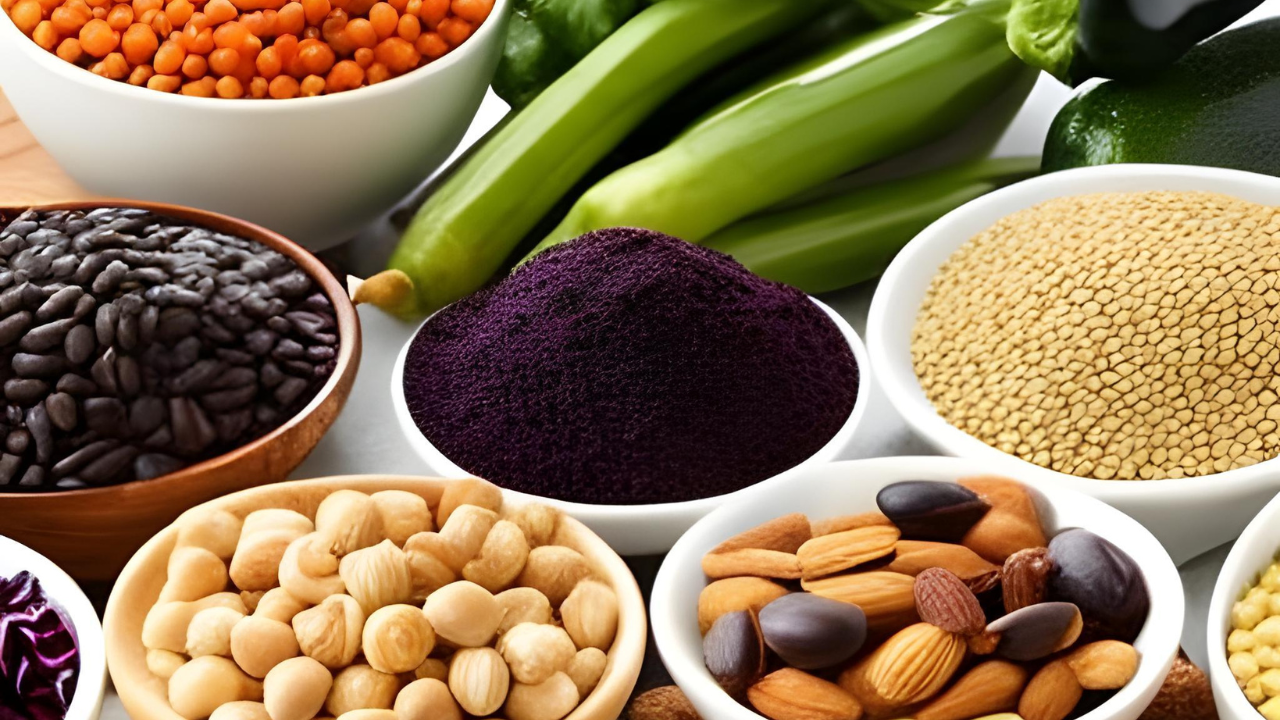Bottom Line of Plant-Based Protein for Nutrition and Sustainability

Bottom Line of Plant-Based Protein for Nutrition and Sustainability
As many individuals are becoming so conscious about their health and the environment, the acceptance of plant-based protein has been with respect to the ascent.
Plant-based protein suggests the protein got from plants such as vegetables, grains, nuts, and seeds, instead of animal-based protein sources for example meat, dairy, and eggs.
Additionally, we will get to comprehend the medical advantages and eco-friendly of applying plant-based protein into our eating regimens.
Benefits of plant-based protein for nutrition
It is significant to adjust our eating regimens to plant-based protein which give different medical advantages to our general well-being.
First and foremost, is normally lower in saturated fat and cholesterol contrasted with animal-based protein sources.
This goes well for the people who are expecting to bring down their risk of heart disease and maintain a healthy weight.
Also, plant-based protein is much of the time wealthy in fiber, nutrients, and minerals.
Fiber is required for stomach related well-being and can assist with managing blood sugar levels and increase satisfaction.
In addition, plant-based protein sources in most cases are so packed with nutrients and minerals, including iron, magnesium, and potassium, which are basic for different body processes.
Moreover, plant-based protein sources can give many amino acids, the structure blocks of protein.
While the fact is that some plant-based protein sources may not have some of the prime amino acids, a diversified and adjusted plant-based diet can without much of a stretch meet all our amino necessities.
Including an assortment of plant-based protein sources into our eating regimens, we can ensure that we are getting every one of the fundamental amino acids our bodies need to work.
Environmental sustainability of plant-based protein
Aside from the individual medical advantages, plant-based protein likewise offers a pivotal support in environmental sustainability.
Animal type of agriculture is a significant contributor of environmental degradation, including greenhouse gas emissions, deforestation, and water contamination.
By picking plant-based protein choices, we can decrease environmental footprint by reducing agricultural emissions by as much as possible in high-income nations.
Plant-based protein production needs less assets contrasted with animal-based protein production.
Growing plants requires less land, water, and energy contrasted with raising animals for meat or dairy.
Additionally, plant-based protein sources should be possible reasonably, by use of clean techniques and practices that assist with soil enhancement and biodiversity.
The need to control our fixation on animal-based protein sources and eating more plant-based protein into our meals, we can increase the value of save our environment which prompts saving natural resources and safeguarding the planet for future generation.
Common sources of plant-based protein
There is a decent choices of plant-based protein sources accessible, making it simple to incorporate them into our everyday eating regimens.
Vegetables like lentils, chickpeas, and black beans are brilliant wellsprings of protein, fiber, and fundamental supplements.
They can be utilized in soups, stews, mixed greens, or even in hand homemade veggie burgers.
Grains like quinoa, brown rice, and oats likewise give a lot of protein.
These adaptable grains can be used as an establishment for meals or added to baked products for an additional protein support.
Nuts and seeds, for example almonds, chia seeds, and hemp seeds, have wellsprings of protein, healthy fats, and antioxidants.
They are also known to be loaded in essential fatty acids, fiber, nutrients, and minerals, and have been endowed in lowering risks of type 2 diabetes and cardiovascular diseases, and so forth.
This should be possible by sprinkling them on salads, yogurt, or enjoyed as a snack.
Furthermore, soy items like tofu and tempeh are famous plant-based protein sources. Equally, they are outstandingly flexible and can be utilized in many dishes, from sautés to sandwiches.
Plant-based protein powders, produced using ingredients such as peas, brown rice, or hemp, are likewise obtainable for the individuals who need a fast and helpful protein source.
Comparing plant-based protein to animal-based protein
With regards to protein, both plant-based and animal-based sources have their own benefits.
Animal based protein sources, like meat, poultry, and dairy, will quite often be higher in specific fundamental amino acids and have a higher biological value. That suggests that they are ingested and utilized by the body.
It is important to note that plant-based protein sources are responsible for so many body’s process through its elements of lower saturated fat and cholesterol content, higher fiber content, and a more prominent choices of the primary nutrients.
Though some plant-based protein sources might not have key amino acids, by mixing different plant-based protein sources into your diet, for instance, vegetables and grains, we can ensure that we are getting a total amino quantity required.
It is critical to take note of that a very much well-organized plant-based diet can give all the essential protein and nutrients for ideal well-being.
By assimilating a different scope of plant-based protein sources into our meals, we can undoubtedly meet our day-to-day protein prerequisites.
Incorporating plant-based protein into your diet
Embrace plant-based protein into our eating regimens can be a straightforward and pleasant process.
Begin by steadily replacing animal-based protein sources with plant-based options. For instance, try swapping meat with legumes or tofu in your favorite recipes.
Investigate various options regarding different grains, for instance, quinoa or brown rice, as a base for your meals.
One more method for expanding plant-based protein intake is by adding nuts and seeds to your meals or snacks.
Sprinkle them on top of salads, yogurt, or mix them into smoothies for an additional protein support.
Besides, you should try as much as possible to eat more plant-based protein powders into your eating routine by adding them to smoothies or baking recipes.
The mission ought to be to zero in on heterogeneity and equilibrium while arranging your meals. It is very crucial to include daily and throughout the day grains, nuts, and seeds to get all or most of the nutrients and amino acids your body needs.
Plant-based protein recipes and meal ideas
To assist you with beginning with integrating more plant-based protein into your eating routine, the following are a couple of recipe and meal suggestion:
Lentil and vegetable curry with brown rice: This tasty curry consolidates protein-rich lentils with different vegetables and fragrant flavors. Sprinkle it over a bed of brown colored rice for a magnificent and nutritious food.
Quinoa and black bean salad: Blend cooked quinoa with black beans, diced vegetables, and a lively dressing for a revitalizing and protein-stuffed salad.
Tofu stir-fry with blended vegetables: Stir-fry tofu with a collection of brilliant vegetables and your number one sauce for a speedy and tasty plant-based protein meal.
Almond and chia seeds overnight oats: Blend almond milk, chia seeds, and oats together, and let them soak overnight. In the morning, top with cut almonds and fresh fruits for a protein-rich and empowering breakfast.
Feel free to experiment the above suggestions and adapt them to suit your taste preferences and dietary needs.
Plant-based protein supplements and alternatives
For the individuals who might battle to meet their protein prerequisites through whole food varieties alone, plant-based protein supplements can be a helpful option.
Plant-based protein powders, like pea, hemp, or brown rice protein, are promptly accessible and can be easily integrated into smoothies, shakes, or heated baked goods.
While picking a plant-based protein supplement, it is critical to search for excellent brands that utilize clean ingredients and have gone through thorough testing.
Keep away from items that contain artificial sweeteners, additives, or excessive amounts of sugar.
It is critical that while supplements can be a significant choice to address protein issues, they shouldn’t replace entire food diversities totally.
It is continually prescribed to zero in on an even up and differed diet that consolidates a mix of plant-based protein sources and other nutrient-dense food sources.
Plant-based protein for athletes and fitness enthusiasts
Plant-based protein can similarly be a beyond belief choice for athletes and fitness enthusiasts.
Despite the common misconception that animal-based protein is predominant for building muscle and improving athletic performance, plant-based protein can give every one of the vital amino acids for muscle repair and growth.
In all honesty, a lot of athletes have embraced plant-based diet and have achieved wonderful outcomes in their games.
Athletes really must guarantee that their optimal performance and recuperation is the beginning of their professions.
They need plant-based protein sources such as vegetables, tofu, tempeh, and quinoa, carbs, and other fundamental supplements to be physically fit for their respective competitions.
Athletes and fitness enthusiasts genuinely must guarantee they are meeting their expected protein prerequisites through a blend of whole plant-based food varieties and, if vital, plant-based protein supplements.
Working with a registered dietitian or sports nutritionist can assist with fostering a customized nutrition plan to meet individual needs and goals.
Conclusion: The bottom line on plant-based protein for nutrition and sustainability
Our health and the environment benefit from the plant-based protein. It is a nutritious and sustainable option in contrast to animal- based protein sources.
It is a no mysterious that we can improve the situation for our general health, cut down the risk of sicknesses, and add quality to our planet by embracing plant-based protein into our eating plans.
Opting for plant-based protein sources like vegetables, grains, nuts, and seeds, we can partake in a gigantic number of fundamental nutrients, fiber, and amino acids.
Also, planning plant-based protein into our eating plans can be an agreeable and adaptable experience, with different recipes and meal thoughts at our reach.
Whether you are hoping to work on your well-being, bring down your environmental impact, or improve athletic performance, plant-based protein is an important choice to any eating regimen.
Go deep into universe of plant-based protein and choose the delightful and nutritious choices that anticipate for you.
Call To Action: Assuming that you’re keen on integrating more plant-based protein into your eating routine, always visit our website for related posts and other topics.
RELATED POSTS
Unlocking the Secret of Iron-Rich Foods in Vegetarian Diets
Embracing a vegetarian diet not only decreases the probability of chronic diseases like heart disease, diabetes, and particular cancers but similarly establishes a healthy weight management scheme.
The Best And Interesting Foods For Optimal Brain Health
Being passionate about maintaining optimal brain health has always been intrigued by the impact of nutrition on cognitive function. Our cerebral mechanism, governing our perceptions, sentiments and conducts, is undeniably the body’s most indispensable entity.
From Thin to Thick: The Best Herbal Supplements for Hair Growth
When it comes to hair growth, many of us are on a never-ending quest for thicker, fuller locks. There is a plethora of products on the market claiming to promote hair growth, but one natural and effective solution to consider is herbal supplements.
FOLLOW DISCOVERY BLOGGER









0 Comments